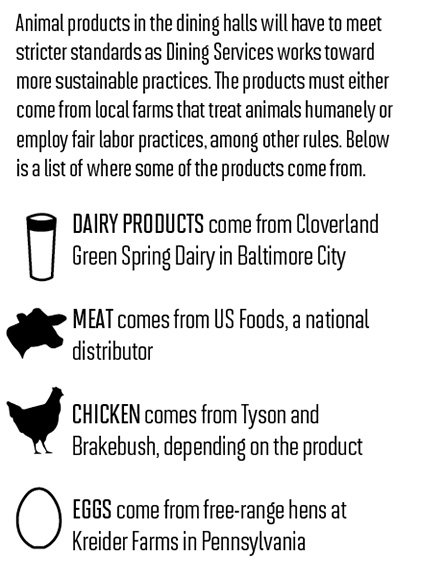
Sustainable food
Animal products in the university’s dining halls will soon meet stricter sustainability criteria as Dining Services continues to move toward more humane and environmentally friendly practices.
Officials evaluating new contracts or renewals with the department’s current suppliers will ask that companies satisfy at least one of four standards — that they be local, treat animals humanely, employ fair labor practices or use ecologically sound practices while raising animals, Dining Services spokesman Bart Hipple said. While not a mandate, officials said the changes should aid the department in meeting a recent goal: having sustainable food account for 20 percent of Dining Services’ supply by 2020.
“In general, we’re changing our purchasing practices,” Hipple said.
According to a student-led assessment this past spring, food purchases that were locally grown, locally processed, ecologically sound and humane made up about 10 percent of Dining Services’ total food expenditures, most of which were for animal products like dairy and chicken. The working group first focused on increasing local sustainable purchasing, which came at no additional cost to the department because products like apples, squash and mushrooms were in season, Hipple said.
The Sustainable Food Working Group, a committee of students and staff members that works to promote more sustainable food options on the campus, will now work toward expanding these criteria.
Cloverland Green Spring Dairy, located in Baltimore, supplies most of Dining Services’ dairy products, while US Foods, a national distributor with more than 60 locations, supplies most of the meat, Hipple said. Tyson and Brakebush are two of the department’s main chicken suppliers, he added, though the chicken supplier depends on the exact product — breaded chicken, boneless breasts and bone-in chicken come from different sources, for example.
Additionally, since 2010, all of the department’s whole eggs come from free-range hens from Pennsylvania-based Kreider Farms, Hipple said.
Hipple said he was not sure if current suppliers already meet these sustainability criteria or if the department would have to choose new businesses from which to buy. However, he predicted companies that aren’t already going eco-friendly would likely soon follow suit to keep up with demand for sustainable products.
“I think that the trend is so strong in this country toward sustainability that if those companies are not currently meeting those criteria … they will be,” he said.
Some companies that employ sustainable practices are more expensive, but not all are, Hipple said, and the cost of sustainable food items is sometimes less than their counterparts. The cost of some items will likely increase for Dining Services and therefore may also increase for students, he said. However, the university’s a la carte dining system, which allows students to choose from a variety of products, and an emphasis on seasonal produce may help keep costs down.
“Our hope and our desire and our push is to really minimize the financial impact on students,” Hipple said.
Students on the Sustainable Food Working Group subcommittees are researching other improved practices with which to target each food product, including manure management, emissions from fertilizer used for feed, nontherapeutic use of antibiotics and fossil fuel burning, wrote Allison Lilly, Dining Services’ sustainability and wellness coordinator. These recommendations, along with those of faculty and staff on the working group, will help determine purchasing decisions, Lilly said.
While Cheryl Lyons, a former VegTerps president, has seen Dining Services improve its sustainability efforts in some areas, the push could go further, she said.
“It seems to me that they’re just trying to get the bare minimum,” said Lyons, a senior communication major. “If you go all the way, then it’s finished and then you have success. I think it’s good for them to try to meet all the criteria.”
However, the department simultaneously faces a struggle to address quality, price and sustainability, said Jen Gannon, a junior journalism major.
“Maryland itself is very sustainable, so I can see them getting [animal products] from very reputable companies,” Gannon said. “On the other hand, I know they have to feed 30,000 kids.”
The seems to have amped up its sustainability efforts in recent years, she added.
“Ever since I’ve been a freshman, I’ve seen so much more compost or separate containers to throw things out,” Gannon said. “I definitely think it’s been evolving.”
There has been a shift in focus toward sustainability on the campus, saidMichelle Safferman, a senior supply chain management major. However, she said it is unlikely all of the university’s animal product suppliers are up to such standards.
“I would have to guess it’s a mixed bag,” she said. “I’m sure there’s a lot of movement towards that, but I’m sure there’s a lot of room for improvement.”



